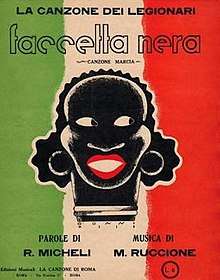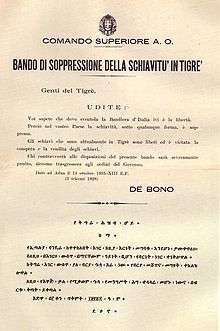Faccetta Nera
Faccetta Nera (Italian: "Little Black Face") is a popular marching song of Italy's Fascist regime. It was written by Renato Micheli with music by Mario Ruccione in 1935.
| "Faccetta Nera" | |
|---|---|
 | |
| Song | |
| Released | 1935 |
| Genre | March |
| Songwriter(s) | Renato Micheli |
History

The hymn is said to have been inspired by a beautiful young Abyssinian girl, who was found by the Italian troops at the beginning of the Italian invasion of Ethiopia.
Faccetta Nera talks about how the black girl will be taken back to Rome and offered a new life, free from the bonds of slavery. There, the song's narrator explain that she will be introduced to new laws and rulers.
During the invasion the song was hugely popular in Italy and caused national fervor.[1] The implicitly erotic song was, however, somewhat of an embarrassment for the Fascist government, which had, starting in May 1936, introduced several laws prohibiting cohabitation and marriage between Italians and native people of the Italian colonial empire.[1] These efforts culminated in the Italian Racial Laws of 1938. The Fascist authorities considered banning the song, and removed all picture postcards depicting Abyssinian women from Roman shop windows.[1]
Lyrics
|
|
References
- Forgacs, David (2014), Italy's Margins: Social Exclusion and Nation Formation since 1861, ISBN 1107052173, pp. 80-81
External links
- the song with the original text:http://www.dailymotion.com/video/xxcmmh_faccetta-nera-con-testo_news